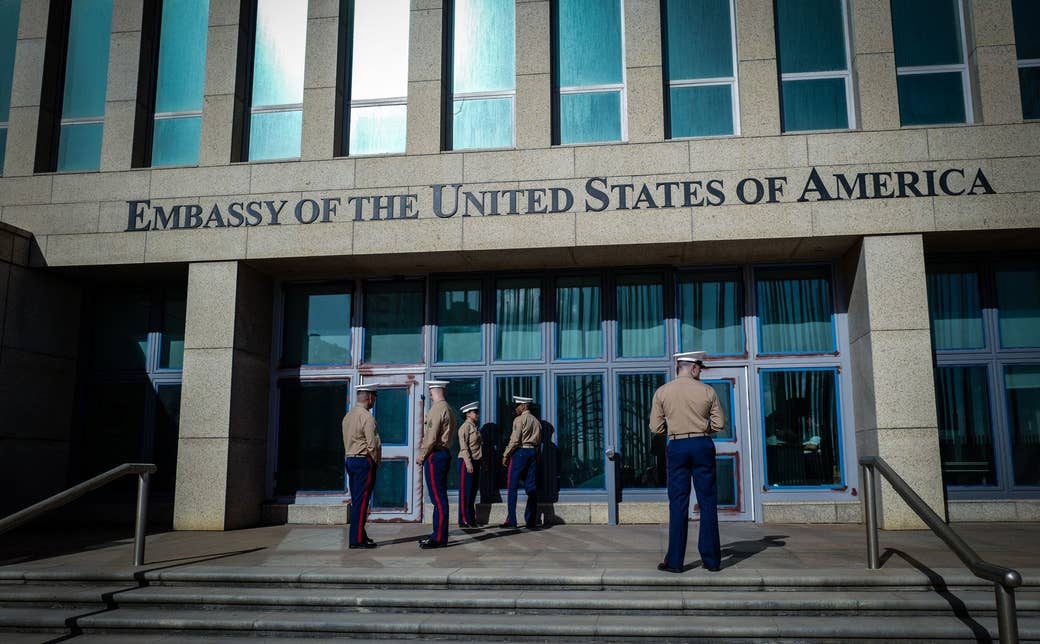
Medical and engineering experts are still skeptical about the US government’s claims of a possible acoustic weapon triggering illnesses among US diplomats in China and Cuba, with some saying the cause of their vague and fairly common symptoms is more likely mundane.
Last week, the US State Department sent a "health alert" for people traveling to China after pulling employees from a consulate in Guangzhou. The alert warned about "unusual, unexplained physical symptoms or events, auditory or sensory phenomena," including headaches, fatigue, dizziness, hearing or vision problems, or a ringing in the ears.
Similar ailments afflicted 21 diplomats in Cuba in the past two years, according to a March medical report with three-quarters of them saying they heard strange buzzing noises in the vicinity before their symptoms appeared.
The illnesses led to Sen. Marco Rubio and other lawmakers asking whether Cuba or Russia were behind some sort of covert attacks. The US drew down its embassy staff in Havana, issued a travel warning, and expelled 17 Cuban diplomats from the US.
In late May, Secretary of State Mike Pompeo reported that two US diplomats in China reported the same sort of illness “entirely consistent” with the past Cuban cases, prompting the State Department to launch a task force with the Health and Human Services and Energy departments to investigate.
Days later, Cuba’s foreign ministry said the US State Department had informed them that another woman US diplomat had “reported health symptoms as a result of ‘undefined sounds’ in her place of residence.”
U.S. has had to evacuate some employees from #China after complaints of mystery illness. And we should have every reason to believe this is just the tip of the iceberg in both China & #Cuba https://t.co/dkf1B80B4e
But experts are hesitant to pin the cause of the mystery illnesses on a nefarious plot.
“No data, no dice,” said University of Michigan engineer Kevin Fu, who led a team that in March suggested that an accidental malfunction of an ultrasonic eavesdropping device could have caused the high-pitched chirping sounds described by some of the affected diplomats in Cuba. But Fu doesn’t know what to make of the new cases in China, since the Cuban cases at least produced sound recordings to analyze. “No one has provided any scientific evidence regarding China to replicate or analyze.”
Fu said that Congress is “overdue” to call on the National Academy of Engineering to investigate the illnesses and determine plausible causes.

Hanging over the Cuba and China cases is the stigma surrounding any illness that might partly have a psychological explanation.
Like Cuba, China has been a high-pressure diplomatic zone under the Trump administration, with US diplomats there facing stress over a possible trade war or conflict over military bases in the South China Sea.
But both the State Department’s chief medical officer and the University of Pennsylvania team behind the medical report have pushed back against any suggestion of a psychological cause, with the latter saying they saw no signs of “malingering” in the diplomats.
Acoustics experts, however, have insisted that a sonic device could not produce the injuries reported in Cuba or China without requiring massive speakers that would be difficult to hide. Sounds in audible frequencies don’t cause long-term nervous system damage, and the three diplomats who experienced hearing loss in Cuba didn’t have the ruptured eardrums caused by violently loud noise.
The Penn medical team report is also under heavy criticism for characterizing the injuries in some diplomats as a concussionlike syndrome. That study “presented evidence far too thin to support the existence of brain damage,” neuroscientist Sergio Della Sala of the University of Edinburgh told BuzzFeed News by email.
A commentary by Christopher Muth, associate editor at the Journal of the American Medical Association, and neurologist Steven Lewis that accompanied the Penn report laid out a range of alternative explanations for the illnesses in the diplomats. Poison seems unlikely, they said, given that the symptoms did not affect organs other than the brain. The cases resembled a kind of “functional” dizziness syndrome that causes severe disability and can be triggered by everything from infections to psychological distress.
Others agreed that may be the cause, or that the culprit may be even more mundane.
“The symptom syndrome they have found is really nothing that unusual and occurs in many other clinical situations after an unpleasant or frightening inciting event,” neurologist Jon Stone of the Western Research Hospital in Edinburgh told BuzzFeed News. These symptoms, he said, would crop up in a small percentage of any large group of people at any given time.
More than 1 in 50 people might be disturbed by a “Worldwide Hum,” for example, hearing the sound of an idling engine everywhere they go.
"My guess is the American government, who employs some of the top investigators in the world ... already has the answer or strongly suspects the answer, but is not saying so out of embarrassment or some other reason," said Glen MacPherson, a teacher from Canada whose website has mapped thousands of self-reported cases of the Worldwide Hum.
Cuba and some experts attributed the outbreak to mass hysteria last year. And biologist Allen Sanborn of Barry University in Miami Shores, Florida, told ProPublica in February that the Havana recordings "sounded to me like cicadas." The insects are also found in Guangzhou, where they are a popular ingredient in street food. (A golden statue of a cicada is displayed prominently in front of the city’s International Finance Center.)

In mass hysteria events, people do genuinely feel their symptoms and suffer from them — they aren’t faking or malingering — something widely mischaracterized not only in the coverage of the cases in Cuba and China but also by the State Department’s chief medical officer in his testimony before Congress. (“Malingering” was actually a stigmatizing term for post-traumatic stress disorder applied to soldiers who endured artillery barrages in World War I.)
“In my view, the China twist makes the likelihood of some type of attack even more improbable,” medical sociologist Robert Bartholomew of New Zealand’s Botany Downs Secondary College told BuzzFeed News via email. He pointed out that the complaints cited by the State Department in China, such as dizziness and headaches, are among the most common in the world, afflicting basically everybody. “Their mishandling of this case is a recipe for what I call The Sonic Attack Scare spreading even further.”
The US has almost 300 embassies, consulates, and diplomatic missions around the world with thousands of employees, Bartholomew added, “all with staff who are now on the lookout for strange sounds and vague feelings of unwellness.”

